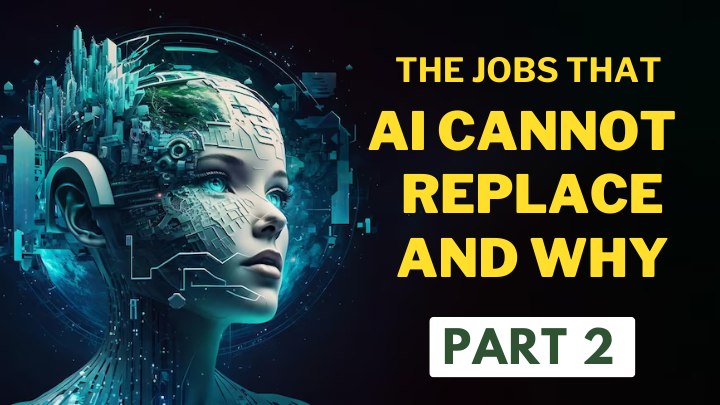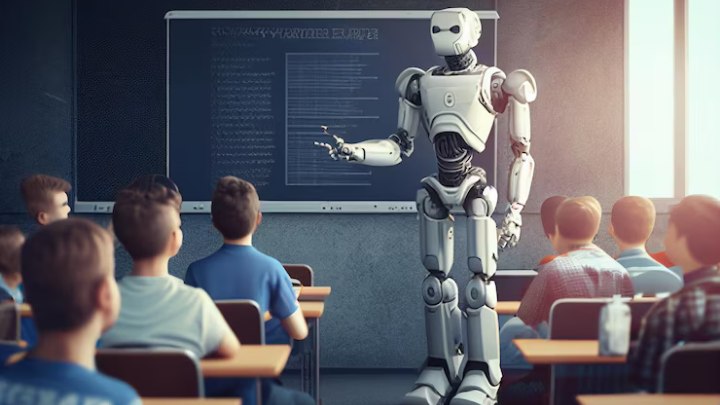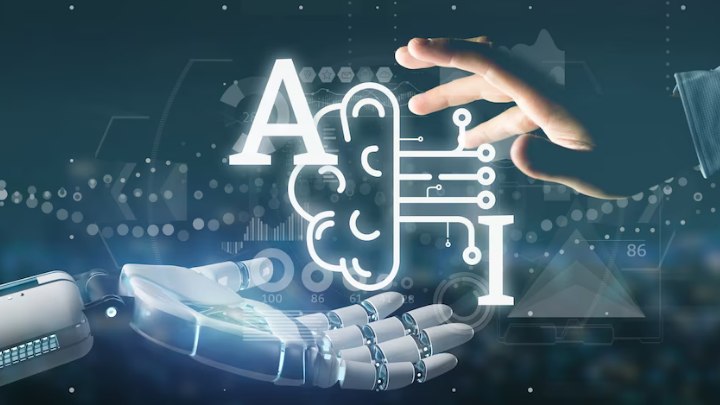
In the series of ‘The jobs that AI cannot replace and why’, we have already seen how business leaders are irreplaceable by AI. Artificial Intelligence can surely benefit various business processes, but it cannot eliminate human role completely. In this second part, we will discuss how AI cannot replace teachers and educators.
During the COVID lock down, we have seen a surge of AI based tools in the education arena in form of virtual tutors and online learning platforms. Initially, it was a tough for everyone to adapt with such online learning methodologies, but it got evolved positively in a very fast manner. Obviously, it is far from the traditional classroom training, but it was the need of an hour. We got used to with various adaptive learning platforms.
Following are some of the main reasons regarding why AI cannot replace teachers. We have discussed various pros and cons of regarding the use and future of artificial intelligence in education domain.
1. Emotional understanding with a student
A teacher or an educator brings an unique and personal touch to his/her students’ lives. It is more than just teaching a topic or a subject. They becomes ideal for students. No AI tool can bond such emotional connection with students. It is a ‘feeling’, which cant be replicated by an algorithm or coding.
One such example is the exceptional movie titled ‘Sir’ (1993), directed by Mahesh Bhatt and the lead role played by Naseeruddin Shah. It demonstrates the unique bond between a student and a teacher. The entire movie revolves around this core relationship. Obviously, AI cannot make such connection with any human. Only a human teacher can identify students’ strengths and weaknesses. Accordingly they change their approach to each individual’s needs.
AI can surely offer a personalized learning experiences to students. He/she can learn at their own pace and focus on the areas where they need the most help. But, it will be always in a way of virtual learning environment. It can be beneficial for rural students, who don’t get proper facility of traditional school. But, with all these, it is digital only. You log out such program and its over. Such barrier cannot be breached due to the machine nature of AI program. It cannot have that human touch.
2. Biased judgement
This is the biggest drawback of artificial intelligence in education arena.
The base of AI is provided by human only, most of the time, who is not a teacher or educator by himself/herself. If the programmer has grudge for something, he/she will write code accordingly. If AI model has to take any kind of judgement, it will follow such inherit biases only.
On the other hand, human teachers and educators work on moral ground. They change and adapt their training as per the student. They know that one methodology cannot be applied to all. Each student needs a different attention and learning pace. Apart from education, teachers also infuse ethics and real life tactics to students. Teachers teach not just academic subjects but also the importance of such life lessons.
All such personal attention helps to make student a better person. This process of character building is nurtured by a teacher throughout. Apart from text book education and course syllabus, educators also conducts extra curriculum activities such as sports, drama, art, community services for students. It requires continuous mentorship and guidance.
How can an AI based program do all these?
3. Emotions / Feelings
One of the primary limitations of artificial intelligence in education is its inability to understand and respond to emotions effectively. A human teacher can offer more than just academic guidance. He/she can provide an empathy and understanding that only a human teacher can offer. According to a survey conducted by the Education Pathway, 93% of students agree that their relationship with teachers is a crucial factor in their overall learning.
AI can only provide information. It may analyze data to identify areas of improvement, but it lacks the understanding required to develop a student’s emotional intelligence effectively. It cannot be streamed into a genuine emotional connection between a student and a teacher. You need a human connection to learn life skills. Adaptation of creativity into students is a long process. It needs to be nurtured slowly and steadily. A teacher plays a pivotal role here.
Well, to answer this problem, AI teacher can give a simulation or a sort of simulated interactions. But, it always has its limitations. One program can’t be fit for all kinds of students. It cannot give authentic emotional support and guidance. You cant measure emotions in a machine language.
4. AI in education can assist in academic tasks, but cannot replace human qualities
AI based system can help for grading papers, managing attendance, and organizing lesson plans. It can ensure optimal allocation of resources and reducing scheduling conflicts. It can also give graph of student performance trends. So, in a nutshell, they are great to get data driven approach. The use and future of AI in education is a huge debated topic. Artificial intelligence surely gives so many potential benefits in the academic arena, to complement the work of educators.
But, human teachers are must to guide students for better and fulfilled life. They provide a cohesive learning environment which teachers life long lessons, not just the bookish knowledge. These are the essential qualities that set human educators apart from artificial intelligence (AI) systems. AI teacher cannot show the dedication and passion of an educator.

By engaging in conversations, understanding personal struggles, and offering encouragement, teachers helps students. The AI based automated systems are a complete fail here. It can only offer a personalized learning experiences, but only a human educator can teach the essence of it. In a long run, it helps students to do moral thinking, which leads to effective decision making. According to Andrew Ng, schools should teach AI to all students.
Education is not only transfer of some kind of knowledge to students. The real education goes beyond the books. It’s about how to implement such knowledge in real life. It has a very vast landscape that cannot be summarized by some predefined text component. Teachers encourage students to explain the learning in their own language and to come with their own problem statements. All these leads to increased curiosity and helps to construct a passion for the subject. Via such slow and tedious process, a student can actually discover his/her liking and interests.
Such open conversation helps students to understand and comprehend the subject fully. AI cannot conduct such explorative methodology of teaching. They cant teach how to think out of the box.
5. Personal attention
Each student is unique. Teachers often gets students facing challenges outside the classroom, such as family issues, mental health struggles, or economic issues. Handling such situations requires empathy and sensitivity. Teachers can provide the necessary support and resources to help students navigate through difficult times and overcome obstacles.
All these requires integrity of a teacher. He/she is not getting paid for doing such out of the way support. And all such things also hamper the personal life of a teacher. But the dedication towards the job drive this thing.
It can be used to provide personalized training and learning experiences for each student to grade assignments more quickly and accurately. It can also serve as a tool to provide feedback to students in a more timely manner. AI can also be used to create virtual learning environments that can be accessed by students anywhere in the world. Having said all these, it becomes apparent that no matter how advanced technology becomes, AI teacher cannot deliver tasks which require emotional appeal on a larger extent. Being a code, AI cannot go on such extent.
6. Over dependency on technology
It’s a very serious drawback of AI in education.
On a practical note, artificial intelligence tools are expensive to develop and implement. All schools would not be able to afford such huge cost. On a large gamut, AI will bifurcate the students are getting good grades in exams. But, it is not the goal of student education. What about the things like critical and logical thinking, which are must for today’s generation? How will such coding machines evaluate student’s creativity?
One more thing. All AI based tools openly claim that they might not be always accurate. So, you can’t use such digital tools to evaluate the questions which requires a emotional appeal or personal response. To grade such things, an educator is needed who knows such things well. To complement this, we might see the innovative ways regarding how to leverage the power of AI in the classroom.
7. Effective education
AI can offer a personalized learning platform, but it can be used as one of the education tool only. AI based educational tools can provide instant feedback to students, helping them understand their mistakes and improve faster. But on a contrary, empathy and personal attention are some of the essential things to provide an effective education. Being a computer program, AI cannot do such activities.

One of the main reasons why AI cannot replace teachers is the approach of teachers to their students. Students can come from any walk of life. They will have their own cultures, religions and reasons for doing some specific behaviours. All these leads to a complex human behavior and emotions. Only a smart educator can handle such vast gamut of emotional appeal. These are very delicate matters, which requires adaptability and flexibility. As per the student, a teacher changes his/her methodology of training and evaluation. They have to go to such extra mile so they can justify everyone’s needs. Such critical thinking can be done by a human only.
Even the most sophisticated algorithm of AI teacher cannot give solutions of it. Adaptation of different teaching style would not be possible for it. It is a very critical pointer regarding the use of artificial intelligence in education.
AI in education examples
Let’s have some real life case studies, tools and apps which are popular in the niche category of artificial intelligence in education.
With the help of machine learning, the core vision of theses tools are to give education in a virtual way. They can be used as a standalone or as a complementary in real life class room education.
- Duolingo: It is a language learning app. You can read, listen and speak up to 40 languages. The app can be customized as per the grasping power of the student.
- Knewton: It suggests personalized course materials to students. It also works at different educational levels.
- Dialogflow: Powered by Google cloud, it can create a chatbot / virtual agent for your various purposes.
- Carnegie Learning: It helps to get detailed knowledge of mathematics, English literacy, applied science and world languages.
- StepWise: It helps students to learn STEM (Science, Technology, Engineering and Mathematics) subjects. It supports interactive lessons with real time feedback.
Conclusion of why AI cannot replace teachers
Obviously, AI enhances the learning process and offers innovative educational tools, it cannot replace humans. We can only embrace the role of technology in the education domain, but with its own limitations. As a tool it can streamline the education process and give us the required insights. Future of AI in education is good due to various potential benefits, but it has a huge set of drawbacks as well.
On a final note, Emotional Intelligence is way bigger than Artificial Intelligence.
Personal connection, emotional intelligence and human touch of teachers and educators will always be needed to nurture students. Only the combination of it can lead to a holistic development of a student. Teachers and AI should complement each other for student success. We will see how these all shapes up in coming years.
